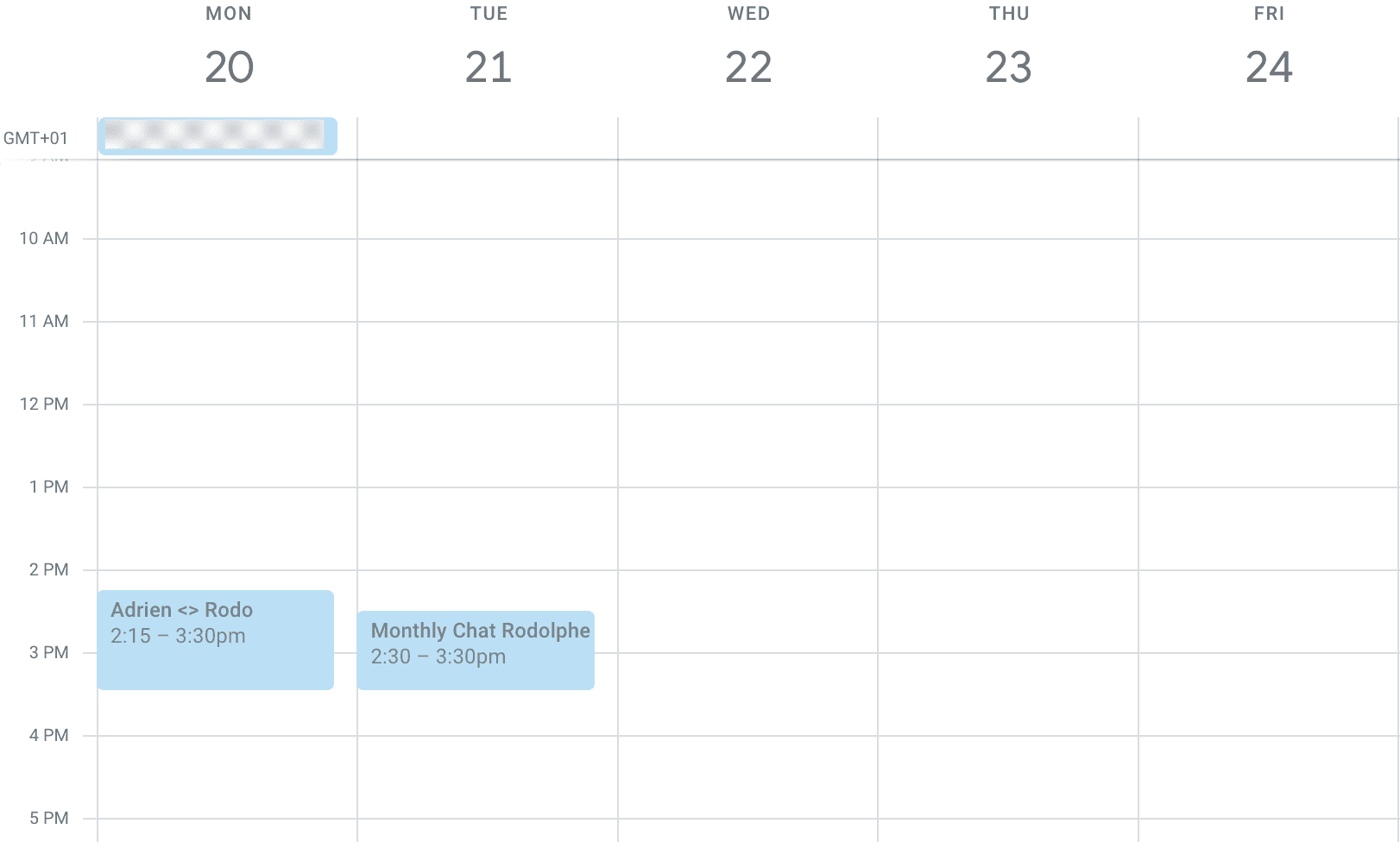Two calls per week
I lead a team of five people by having two calls per week. Here's how we work asynchronously as a remote team.

I lead Remotive, a team of five people trying to work asynchronously.
I have two calls per week.
Here's my calendar for a typical week:

That means:
- One call with my cofounder, we prepare & take notes on Docs.
- One call with a team member. Each month, I do 3 of those 1-on-1.
Sometimes, one or two extra calls may appear ad-hoc. That's about it 🤷
Important disclaimer:
Keeping a clean calendar is much easier when running a profitable or bootstrapped business. Otherwise, I would personally prioritize getting to profitability and would likely have a busier calendar.
Why limit calls / go asynchronous?
As an introvert, I find calls draining. I felt burned out in previous jobs from doing too many calls. I love keeping an empty calendar and skipping calls.
It lets me organize myself in a way that suits me better. I need time/energy to do things and be creative.
"Creativity starts with an empty calendar and ends with a full one." - @naval
— Naval Ravikant Bot (@NavalBot) May 7, 2020
What's the catch/cost?
- Selling differently. I rarely do sales calls, yet I know that more calls mean more revenue. An empty calendar is a sales manager's nightmare. We're missing out on enterprise-size deals, we still prioritize email conversations with great results.
- Less 1-t-1: Ideally, meetings should be more coaching-oriented than "running through a list". I'm still working on that, inspired by Kevan Lee's awesome tips.
- Changing company culture is hard. At Remotive, we've been transparent with our new hires on how we work asynchronously. If your team loves calls, shifting to async is trickier. Here's Doist's great guide.
- Fewer calls ≠ fewer problems. Removing calls doesn't make business problems go away. You have to be more intentional about how you solve problems.
- Fewer calls = more discipline. One counter-intuitive learning is that it takes more discipline to have an empty calendar. I can't default to hopping in the next call, I need to organize myself to get things done on my own time.
What "accepting a quick 10.30am call" means:
— Rodolphe Dutel (@rdutel) March 27, 2019
9am- Pick an unambitious task because of your call
10am- Interrupt yourself in order to prepare
10.30am- Hop on call, it may start late
11.30am- Call ran over, hanging up
11.45am- Ok, back to emails now!
12pm- Where did my morning go?
Why do fewer calls works for us?
- We're an async-friendly business. Pre-product market fit teams or agencies may struggle with fewer calls. We focus on optimizing our self-serve service. Relying on async processes and documentation makes sense for us.
- Communicate differently, not less. We treat Slack like an answering machine; we ask questions without expecting immediate answers. Each week, I share written updates with the team. Each month, I share a summary of what has happened:

- Prepare more and trust the process. We over-prepare the few calls we have. Sharing a written agenda ahead of time can halve talking points and leave time for small-talk. We also document all the things with a solid reporting/CRM.

- Async is polarizing. We're lucky to work with a team that enjoys working asynchronously. Some people would be unhappy to work in a team that doesn't connect much or scales blazing-fast; I fully understand that. At Remotive, we encourage team-member to connect with one another once a month.
- Top async teams meet in person. Possibly counter-intuitive, yet connexions and building report face-to-face matter! Remotive is planning its first-ever full-team physical retreat in Croatia with an introvert-friendly schedule...💆

Over to you
I'm curious, what's your take on meetings and organizing your calendar?
Let me know on Twitter!